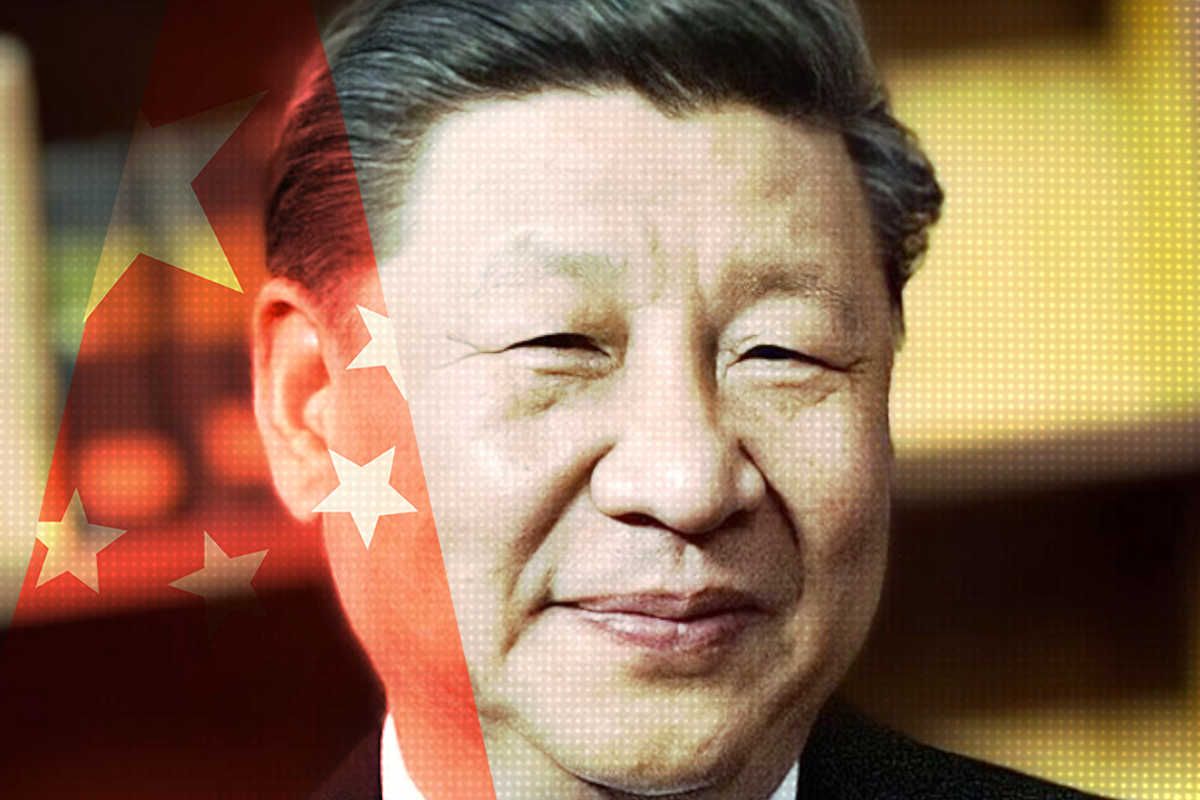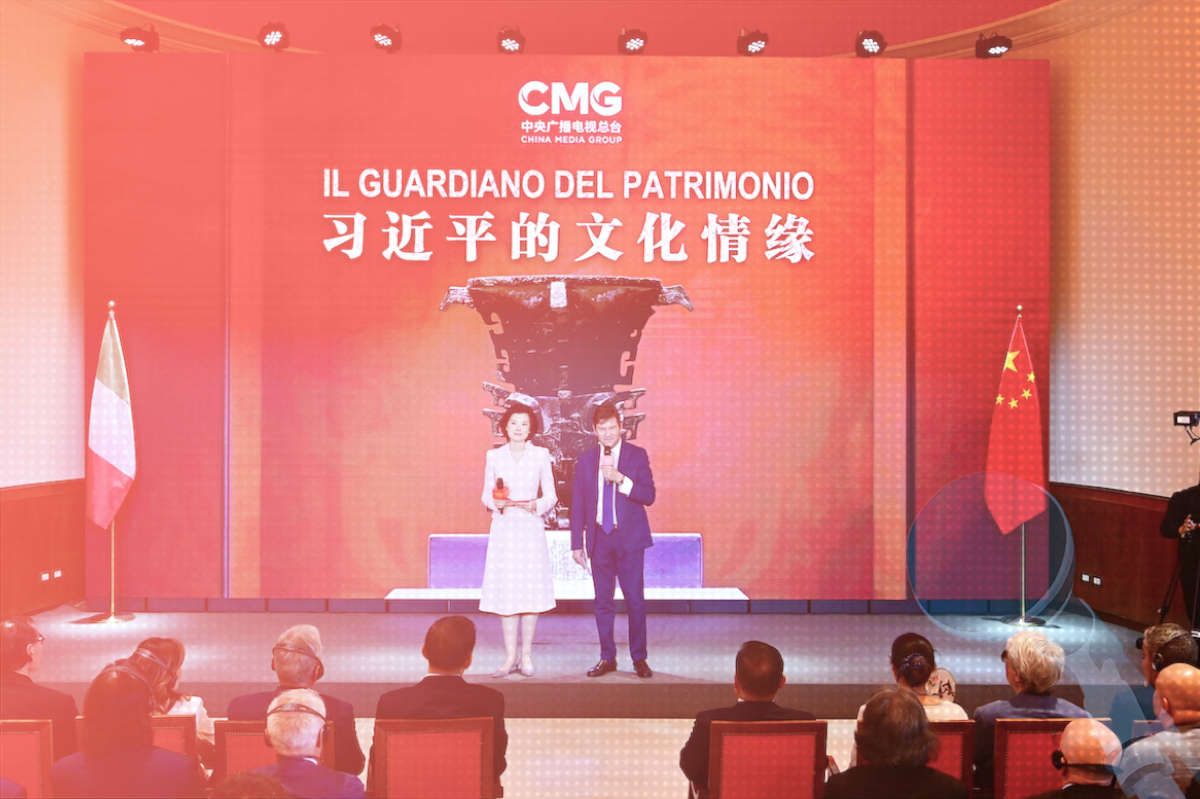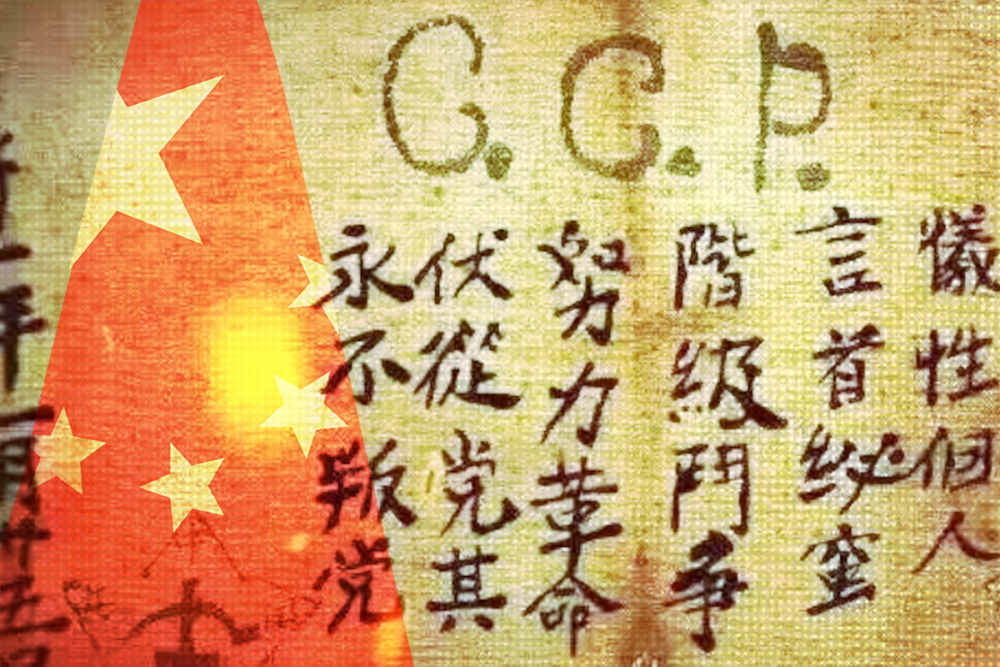
On a cold January evening in 1931, He Yeduo (贺页朵) pledged his life to the Chinese Communist Party. The 45-year-old Jiangxi peasant was barely literate, but at the oath-swearing ceremony on a Red Army base in the Jinggang Mountains, the “cradle of the Chinese revolution,” he took out a piece of red cloth and began writing.
A quarter of the Chinese characters he wrote, professing his faith to the then-embattled and apparently doomed guerrilla forces in his native province, were misspelled. But at the top of the cloth, now regarded as a divine relic of the revolution, are three perfectly formed letters, the name of the organization he would die for: “C.C.P.”
Nine decades later, these three letters have become an unacceptable slur to many supporters of He’s beloved Chinese Communist Party.
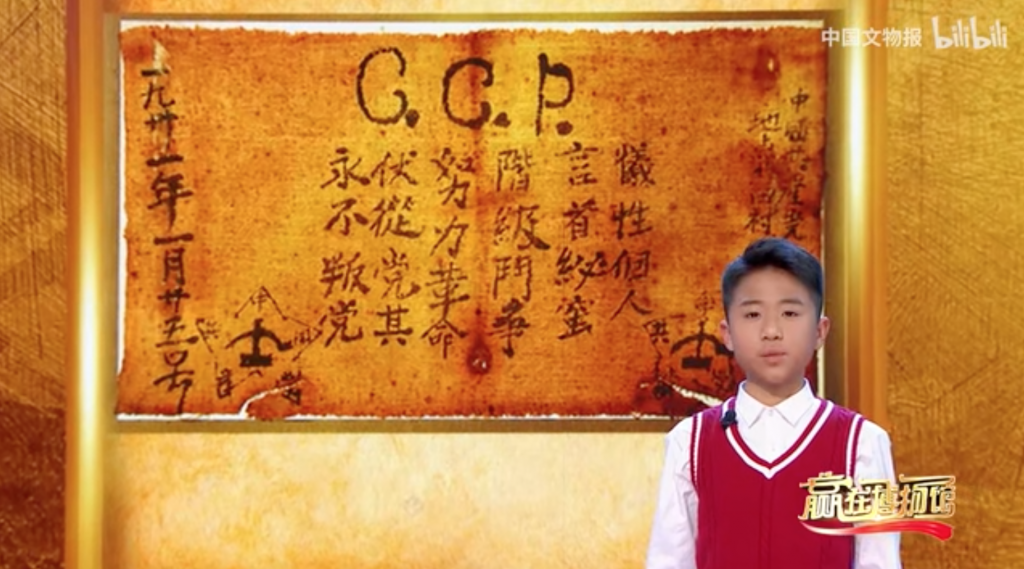
Acronym Acrimony
“CCP”s fall from the sacred to the profane can be cataloged by an emerging discourse in pro-CCP online circles demanding foreign scholars, journalists, politicians, and everyday internet users defer to the more recent translation currently favored by the Party: the “Communist Party of China,” or “CPC.”
Nationalist tabloid the Global Times suggested in December 2022 that the word “Chinese” is a racist dog whistle. A 2021 article in Australia’s Canberra Times argued that the acronym CCP makes the “racist” and “ludicrous” suggestion that “all [Chinese] share the same political beliefs” — a suggestion that the Party itself, which routinely claims to enjoy the “wholehearted support of all Chinese people,” may not find so offensive, if it were being made at all. Across social media platforms, the CCP’s supporters have also taken to branding those who write “CCP” as anti-China, and thereby fair game for mockery or disregard.
Interestingly, however, Chinese-language accounts from state media and even the Party itself do not share the same venom over this — for some, anyway — emotionally charged debate. A post from the Communist Party’s official CPC News (www.cpcnews.cn) website describes the distinction between the two acronyms as such:
Both CPC and CCP refer to the Communist Party of China — it’s merely that the officially recognized wording domestically is CPC… Some foreign media continue to use CCP […] but that doesn’t mean that every article using CCP is negative and every article using CPC is positive; whether it is negative or positive depends upon the specifics of its content.
The terminally-online acrimony over acronyms may be recent but the distinction itself, as the article explains, is not. According to official accounts, the Party made the move from CCP to CPC 80 years ago.
A Historic Reshuffle
“Overthrow the power of the capitalist class,” “eradicate capitalism,” and “join the Comintern”: these were part of the First Program passed by the Chinese Communist Party on the day it was founded in the French Concession of Shanghai on July 21, 1921.
The third item should hardly come as a surprise. Two agents of the Communist International, also known as the Third International, were present at the clandestine meeting and had been instrumental in organizing it. In the CCP’s early years, the Comintern’s Far Eastern Bureau had a profound — and welcome — influence on the Party. At the time, Communists the world over saw themselves as members of a single, global political movement with its central nervous system in Moscow.
Soviet guidance ensured that Leninism beat out more popular schools of leftist thinking such as anarchism. It also pushed the Communists into a tenuous United Front with the Kuomintang. But as time went on, patience with these European advisors wore thin, and a “native Communist” faction stressing the Sinification of Marxism and peasant revolution rose to prominence under Mao Zedong.
The Long March from the Jinggang Mountains to the dugouts of Yan’an was a key moment in this power struggle, with Mao’s guerrilla warfare strategy emerging triumphant from the Zunyi Conference. The influence of the Comintern agents and their Soviet-trained allies was still alive, but just barely. The death blow came in 1943, at the same moment as we are told the change from CCP to CPC occurred.
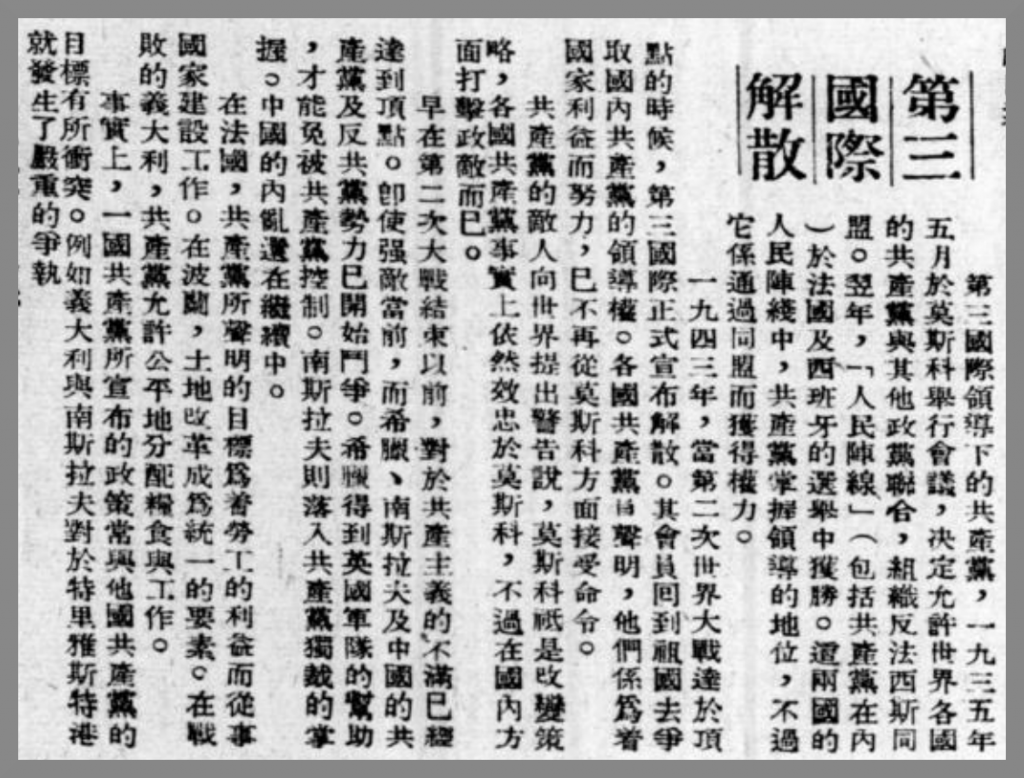
Hitler’s invasion of the Soviet Union meant that Moscow joined the side of the Allies in 1941, and it would not do for the Comintern to be actively fomenting revolution in the countries the USSR now fought beside. Many Communists had already been driven away by the pressures to enable Naziism at the expense of their countries in the years of the Molotov-Ribbentrop Pact, and on May 15, 1943, the sword dropped: The Third International officially dissolved. The workers of the world had to find their own way.
The demise of the Third International made Mao’s triumph all but a fait accompli: Wang Ming (王明), his Moscow-trained main rival, was cut off from his base of support; China was forced to forge ahead with its own revolution on its own terms; and a cult of personality coalesced around the newly christened “Chairman” Mao. It was a political earthquake for China, but the tremors were felt all around the world.
In the ensuing scramble out of Moscow’s shadow, communist parties the world over created new identities for themselves. The Chinese Communist Party was one of them, rechristening itself, so the official histories say, the Communist Party of China. CPC News again:
From the perspective of linguistic analysis […] “of China” is more focused on the Party’s property of “belonging to China,” emphasizing this subordinate relationship. “Chinese” means “related to China,” focusing more on the properties of it being a Communist Party, which weakens its subordinate relationship to China.
Apparatchiks’ desire to nominally distance themselves from the Comintern and foreground their national identity is understandable. Many other communist parties were doing the same. But their unique “linguistic analysis” presents a more impenetrable logic.
Indeed, every other major communist party rebranding themselves for this same reason in 1943 moved in the other direction, taking their home country from the backs of their names to the most important position according to their own “linguistic analysis”: the front.
Thus in 1943 the Communist Party of Italy became the Italian Communist Party and the French Section of the Communist International became the French Communist Party. When West Germany’s Communists regrouped in the 1960s they also changed their party’s name from the Communist Party of Germany to the German Communist Party. In all these cases, too, the new English names were incidental to the new names in their native tongues. The CCP, uniquely, only changed the official English translation of its name. In Chinese, it is the same today as it was in 1921: 中国共产党 (literally, “China Communist Party”).
Consistently Inconsistent
Some scholars question this official account that the switch from CCP to CPC occurred as early as 1943, noting the persistence of “CCP” in official language for decades thereafter.
“[CCP] is what I first encountered when I read Peking Review in the 1960s, and later when I read English translations of the Chinese Party’s attacks on the Soviets in the 1950s,” says Australian sinologist Geremie Barmé. “Then there were the Nine Critiques of the 1960s, translated at the time into English as well. That’s just to mention just a few. So the line about 1943 is nice enough, but from my experience not accurate.”
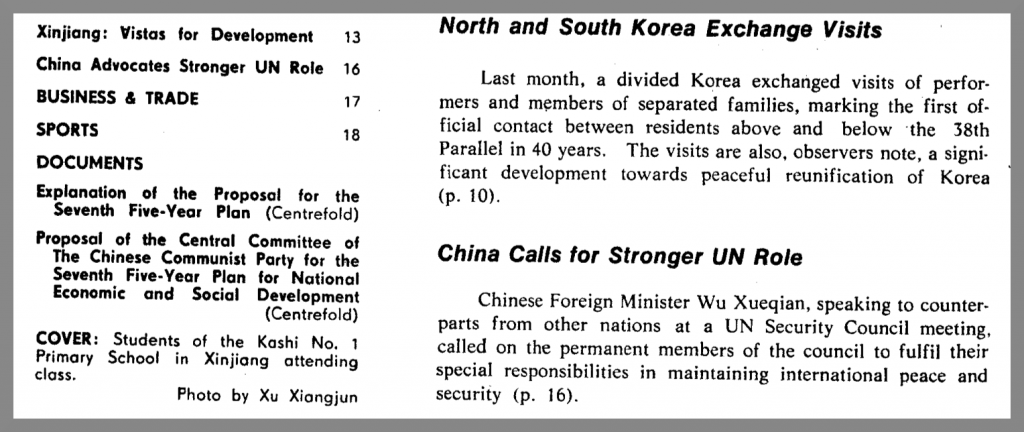
And even if the official translation did change in 1943, it is clear that the change was not strictly enforced, nor imbued with any special ideological significance, for many years. Perusing the publications collected by the Marxists Internet Archives, including both officially sanctioned periodicals from Beijing as well as independent leftist organizations from around the world, presents a disorienting picture.
Some use “CCP” and “CPC” interchangeably in the same breath. Some write of the “Communist Party of China (CCP)” while others refer to the “Chinese Communist Party (CPC),” mixing the acronyms and full names with wild abandon. For decades, the two have been used by Beijing’s supporters and critics alike with no evident prejudice. Indeed as recently as 2016, the official translation of Xi Jinping’s speech marking the 95th anniversary of the Party’s founding, supplied by the state-run Xinhua News Agency, refers to the “Chinese Communist Party” precisely 100 times.
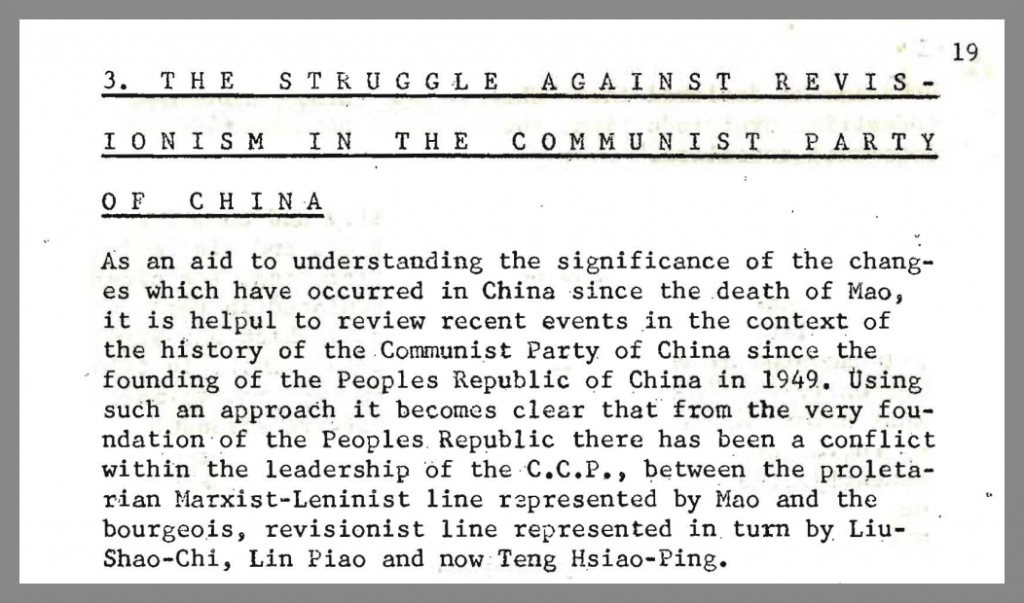
Considering the enduring confusion, it comes as no surprise that the messages put forward by different organs of the party-state are not only inconsistent but even contradictory. The Party itself says “CPC” is superior because it emphasizes the Party’s Chineseness, while the Global Times argues “CCP” is racist because it emphasizes the Party’s Chineseness.
Attaching minor points of language with immense importance comes naturally to the world of Chinese statecraft. State media strictly forbid use of the phrase “mainland China” in favor of “the Chinese mainland,” for example, because they believe the former is a “Western language trap” laid by cunning foreigners to lure unsuspecting Chinese into implying that there is a non-mainland China as well, and by extension more than One China. Native English speakers would likely be shocked to learn that by using the phrase “mainland China” they are, according to Beijing, making a bold statement about the legitimacy of the Republic of China government. (Never mind that the phrase is considered anachronistically pro-unification on the other side of the Taiwan Strait and now is typically replaced with, simply, “China.”)
This paranoia and obsession with establishing the correct “subordinate” relationships through language has been a hallmark of Chinese mandarins since dynastic times. It can be traced back to the Confucian concept of the “rectification of names” (正名), which posits that without names that correctly correspond to reality, social order will disintegrate. Supercharged by Marxist-Leninist dogmatism and all communist parties’ obsession with maintaining a “politically correct” party line, however, it is not entirely ancient — and nor is it uniquely a product of Chinese political culture. Proponents of the CCP from far and wide have likewise latched onto the CCP vs CPC dichotomy is a litmus test for whom they can trust.
Much Ink Spilled
Geremie Barmé compares this high-octane, low-stakes argument to the question of how many angels can dance on the head of a pin: a debate with no practical value or intellectual consequence, serving only to distract from more urgent concerns. But another way we can conceive of this (non-)issue is as a sort of Rorschach test for observers of China.
Like the test’s inkblots, the decision to write “CCP” or “CPC” has, by the Party’s own admission, no intrinsic meaning — but how one imposes one’s own meanings upon the two can yield insights into one’s ideological biases. Those who see the common-usage “CCP” as an anti-China dog whistle betray their determination to perform obeisance to Beijing and attack its critics’ characters by any means; those who see “CPC” as the badge of a fanatic Communist acolyte similarly betray their own McCarthyite mission to ferret out the apocryphal “reds under the bed.”
Instead of focusing on who uses which acronym, the rest of us would do better to look at who professes to care that much.

